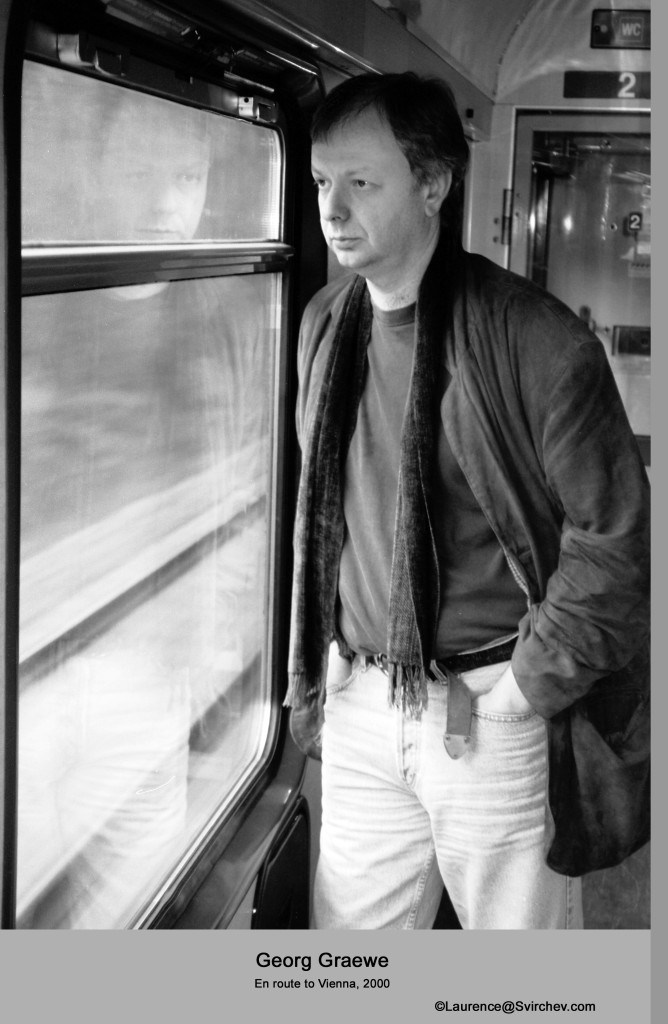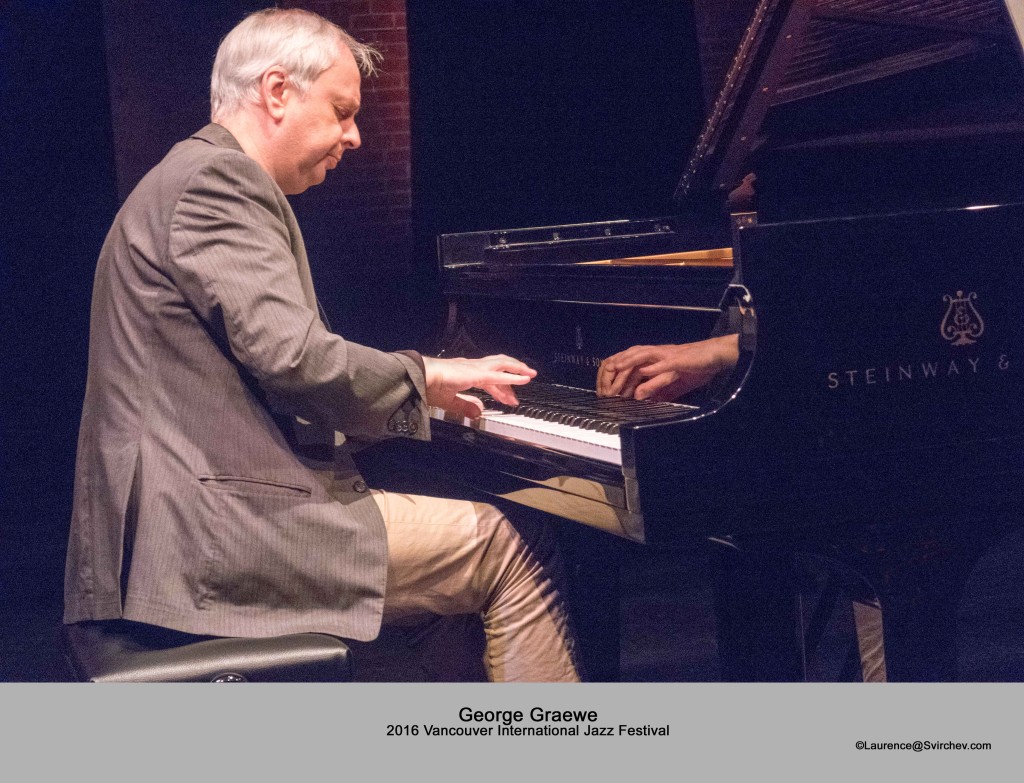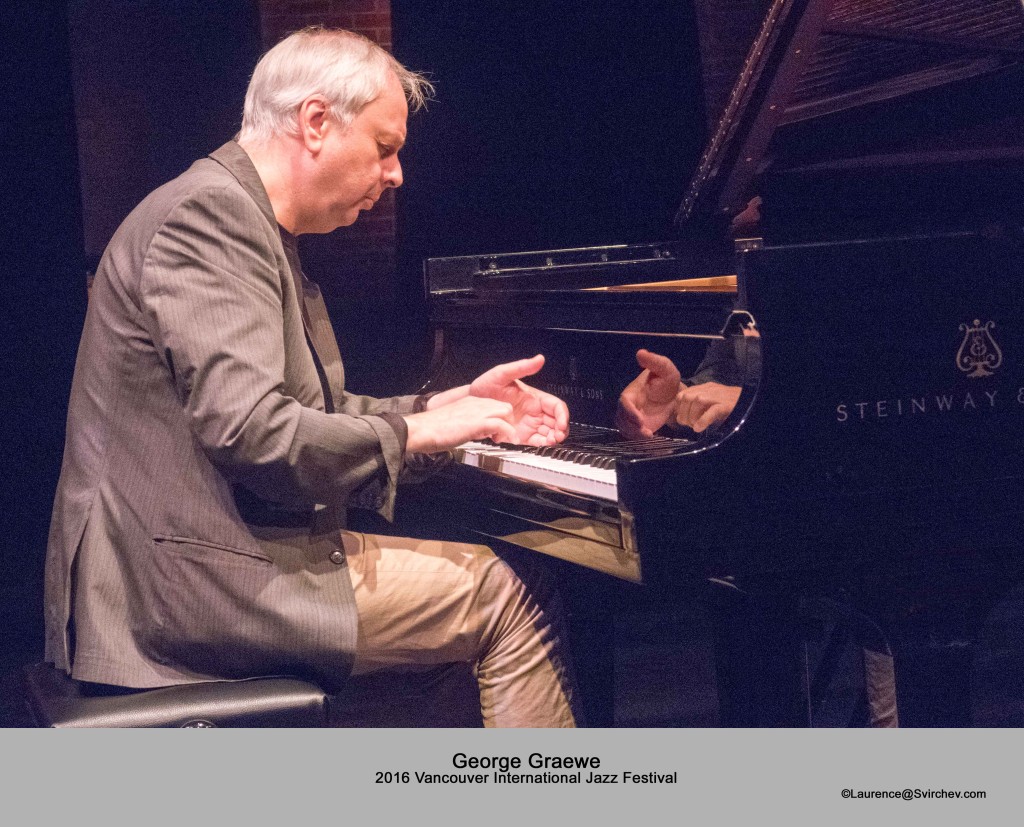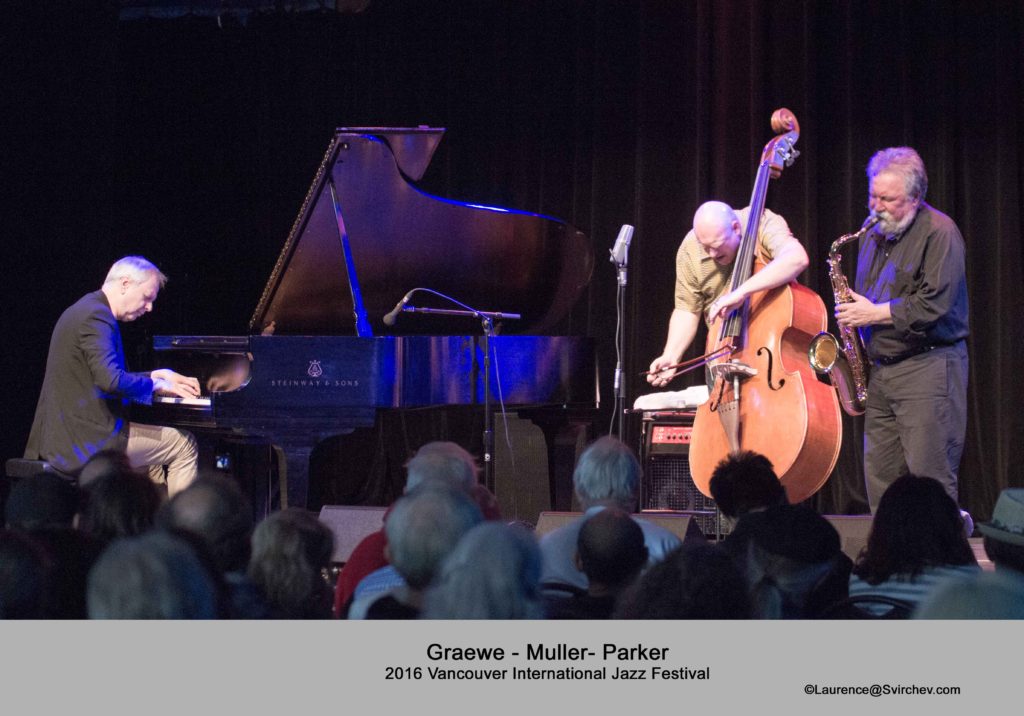Moderne: Georg Graewe at the 2016 TD Vancouver International Jazz Festival
Rimbaud: “il faut être absoluement moderne.”
Richard Feynman: “Poets do not write to be understood” from Six Easy Pieces.
Georg Graewe’s invitation to the 2016 TD Vancouver International Jazz Festival was felicitous: he had not been seen in the city for at least a decade and a half. He performed three times: a solo recital at the Roundhouse, a trio with Evan Parker and Torsten Muller at Performance Works on Granville Island, another trio with Dylan van der Schyff and John Paton at the Ironworks. He also served as a lecturer at the University of British Columbia Improvisers’ Colloquium. In the 1990’s Graewe had been a regular in Vancouver’s scene, but his last gig in Vancouver appears to have been in 2000. This essay presents some of his substantial career accomplishments.
Pinning down Graewe’s first visit to Vancouver is difficult. In today’s society, many seem to think that the encyclopedia of factual stuff is readily available by a google search, but it ain’t necessarily so. The histories of the Classical Joint and the Glass Slipper, among Vancouver’s core venues for creative music in the 1970s to 1990s, are appallingly under-documented on the internet. Even the Western Front’s massive internet documentation misses some of his performances For sure, Graewe played with his long-standing trio (Gerry Hemingway and Ernst Reijseger) at the Glass Sipper on June 21, 1991. The next day the trio recorded “The View From Points West” at the Western Front during the duMaurier International Jazz Festival. The CD was issued on the Music & Arts label, and count yourself lucky if find a copy of this tour de force.
Graewe is originally from the German mining and steel milling district of Bochum. At the 1993 Vancouver festival he presented his Grubenklang (“Sound of the Mine”) Orchestra and at the 1995 edition, he played in a combination with François Houle and Joêlle Léandre (an out of print CD of the trio was made on Red Toucan, Live at Banlieues Bleues). Then in 1999 he appeared at the Festival with William Parker, Peter van Bergen, and Susie Ibarra and in trio with Hamid Drake and Kent Kessler at the 2000 Festival. He also performed at the 1996 and 1999 Time Flies series.
Graewe was an accomplished musician long before his Vancouver appearances. By 1991, he had three Grubenklang Orchestra recordings under his belt, including one on the prestigious HatArt label. The Graewe-Hemingway-Reijseger only, Graewe’s musical approach. That impish play on words is not the only one in his English-language repertoire. The name of his label is “Random Acoustics.
Graewe is is an in-depth thinker and he explained, “The name Random Acoustics is about the characteristics of the piano, not so much about the instrument being sub-standard, which I would not accept anymore. There’s been an ever-increasing tendency over the last decades to “harmonize” the recorded sound of the piano, which means to narrow it down. But every single instrument has its own characteristics, even within the same brand, and at every recording as well. When you compile a CD from several performances those characteristics should come through and not be flattened out. I’m not talking about anything like “the natural recording,” which I do not believe in, but I think the acoustics on a recording are part of the artistic construction and should have a range of variety – as elements to be accessed at random.” ‘Random Acoustics’ and ‘Sonic Fiction:’ one can only wonder what kind of yin-yang expressions he comes up with in his own native tongue of German and his local dialect.
His arrival in Vancouver in the early 1990‘s serves to underline the astute decision-making of the Coastal Jazz & Blues Society and its Artistic Director Ken Pickering to bring already-mature contemporary, ”moderne” European musician-composers to Vancouver’s scene, making local connoisseurs privileged while other communities could only wish and hope. More than one European musician essentially unknown in North America had Vancouver as port of entry to the Canadian and American scenes.
Graewe, went on in 1999 to establish an enduring relationship with the Center for New Music and Audio Technology at the University of California, Berkeley and touring in the United States in particular with the Chicago school of contemporary musicians such as Ken Vandermark, Jeb Bishop, and Kent Kessler. Of significance was his Octet tour (including Peter van Bergen and drummer – sawyer Paul Lovens) of Vienna, Zagreb, and Graz. The notated and open score was called “Snapshots,” a dice-laden set of short compositions thrown at expert musicians. Graewe asked the musicians most adept at open forms (like Vandermark) to play on the precise notations; conversely he asked the players most proficient in reading (like Anne LeBaron) to extemporize. The results indeed were a controlled random acoustics.
After his initial 25 years of prolific recording, he slowed down this aspect of the music business while continuing to compose and tour. Of his 32 recordings, only three are post-2000, his latest being the 2015 “Stills and Stories” on Random Acoustics. Graewe explained, “For quite a while I did not really feel like putting stuff out, mainly because it seemed that everybody else was putting out everything all the time in large 5-10 CD boxes. I did not want to be part of that game. At the same time I’ve never stopped recording and now I’m stuck with all those “tapes” most of which I’ve not listened to yet. I will never catch up, but I’ve started releasing stuff again, very selectively. Some more are coming up in the near future.”
Graewe explained, “For quite a while I did not really feel like putting stuff out, mainly because it seemed that everybody else was putting out everything all the time in large 5-10 CD boxes. I did not want to be part of that game. At the same time I’ve never stopped recording and now I’m stuck with all those “tapes” most of which I’ve not listened to yet. I will never catch up, but I’ve started releasing stuff again, very selectively. Some more are coming up in the near future.”
Instead of the big-box approach, Graewe went the route of large-scale commissioned work, stuff that could never fly in North America, and therein lies a tale that is quite unknown in North America. Since 2002, he has composed three operas and a massive production for the 2010 Ruhr Cultural Capital of Europe which he called “grubenklang.reloaded”. The operas are “Kopenhagen” (2003) for Opera Cologne, “Quicksilver” (2006), a commission by Semperopera Dresden, and “Barbara Strozzi oder die Avantgarde der Liebe”, staged by Theater Luzern/Switzerland in 2010 and Opera Bonn/Germany in 2011.
Graewe has always emphasized a classical definition of a musician: someone who has the chops to read and perform music, the abilities to compose and invent coherent music immediately in any context, and the obvious part, someone who lives and thinks music as part of the realm of ideas. It’s a given that the great musicians know the history of musical development, including its relationship with social and political changes. But what is rarely discussed in the jazz literature is how the developments of science and music influence each other. There are examples of modern physical scientists who turn to music as career choice (for example, John Butcher), and there are multiple examples of creative musicians who compose about social issues (for example, Wadada Leo Smith) but Graewe is a rare example of a musician who is profoundly interested in science and who has composed a substantial amount of music with science directly in mind. In this sense he is a classicist with a Leonardo daVinci type acumen, from the centuries when literati were all musicians, scientists, visual artists, or inventors. Perhaps such a type could only come from a European intellectual experience in today’s world.
Graewe’s astute creative thinking is reflected in how he decided on the “Kopenhagen” opera project. “I had been thinking of writing an opera for a very long time, looking for the right text and subject. I had set up a few ‘dogmatic conditions’, ruling out any author who was not alive, and anything that smelled like a drama. In 2000 I came across the Michael Frayn play [“Copenhagen”], and read about performances in the NY Times while residing in Berkeley for half a year. That was the text I’d been looking for. I scored it for three singers and chamber orchestra.”
Frayn’s stage-play and subsequently Graewe’s opera was based on a WWII meeting between physicists Werner Heisenberg and Niels Bohr in occupied Copenhagen, Denmark. Bohr was Danish and also Jewish, in process of escaping that country for England. Heisenberg was working in a German military research department. The play, set in after-life, makes for a case-study of brilliant minds reassessing their science, philosophy, and ethics, all subjects which Graewe is intensely interested in.
In 1927, Heisenberg had found that at the sub-atomic level, if one specified where an electron would be the exact time that it would arrive at the point could not be determined. He formulated an “Uncertainty Principle,” namely that nature does not dictate the outcome of any process, but allows for many outcomes, each with a probability of realization. Does that not sound exactly like what happened when Earl Hines played with Louis Armstrong or Coleman Hawkins played with Thelonious Monk? The birth of quantum mechanics, of which Bohr was also one of the principal architects, has changed humanity’s basic vision of how we fit in the universe, not in a static and linear way, but in the context of a certain unpredictability in a curved space-time.
Now it would be easy to consider that the consequences of probabilistic quantum mechanics are either too large or too small to be felt by humans, that it has zero effect on how music is played and affects our emotions. But consider this statement from Stephen Hawking: “If general relativity [Einstein’s idea] were not taken into account in GPS satellite navigation systems, errors in global positions would accumulate at a rate of about ten kilometers each day” (The Grand Design). Think about that if you are using google maps to get to an Ironworks jazz gig or a restaurant you haven’t been to before. Or apply the idea directly to music: the development of the laser and digital music communication technology could not have happened without quantum mechanics.
But is a more humanistic and less mechanistic way to think about this grand design: building things like satellites is the product of the human brain, an organ so exceedingly complex and inherently creative that no one really understands how it works and why it works. We only know that the uncertainty principle must be active at a sub-atomic level in the bio-chemistry of the brain just as it operates universally in non-organic matter. There is uncertainty even in music that is completely notated and practiced routinely as repertoire. Every musician knows this by intuition, and that is what interpretation is all about. But then take the extemporaneous music-making of three advanced brains like Graewe-Müller-Parker, each operating independently without a score, without even a preliminary discussion of what they are going to play. Their purposeful uncertainty, demonstrated at their Festival performance, results in a musically wondrous coherence.
Seven years after he staged “Kopenhagen’ Graewe was invited to curate and produce “grubenklang.reloaded,” a creation for the 2010 Ruhr Cultural Capital of Europe. There is no equivalent of Cultural Capital in Canada or the United States, unless one counts the massive dollars that are plugged into the arts when the Olympics comes to town. By any standard “grubenklang.reloaded” was a colossus: 27 nights of music, poetry, satire, science, fiction and film. The concerts were spread, by artistic design, over six cities and festivals, venues ranging in size from a 30-seat bookstore, the historic industrial blast-house Henrichshütte with 400 seats, to a 2500 person audience at the Moers Jazz Festival tent. There was no repetition of content or form with one exception, his video-cantata on Einstein’s travel diaries. “grubenklang.reloaded” was professionally audio-recorded and two nights were filmed: his Albert Einstein cantata, “Alle Kennen Meine Visage” (Everyone Knows My Face), and one show by the GrubenKlangOrchester.
The results were presented in a special-edition DVD and art-print magazine for Random Acoustics. The DVD includes historical sketches of the relationships between music, science, and social change, in particular the working class socialist movements in the traditional Ruhr industrial area in the 1920s & 30s. While the emphasis is decidedly “absoluement moderne”, the deeper past is not neglected, for example in an essay demonstrating how Beethoven was influenced by philosopher Immanuel Kant’s dialectical ideas, “thus creating a special kind of relationship within his Sonata form and producing extraordinary dual forces to act as symphonies” (grubenklang.reloaded documentation).
The one exception to repetition was the production concerning Albert Einstein’s travel diaries, “Alle Kennen Meine Visage”. That production, scored for two singers, narrator, chamber ensemble, and video projection had premiered at the Jewish Museum in Berlin in 2005.
Graewe explained that the Einstein project came about by chance: “The Max-Planck-Institute for the history of science in Berlin were preparing for a grand Einstein exhibition in 2005 to celebrate the 100th anniversary of his “annus mirabilis 1905,” the year when he published three ground-breaking texts. A journalist friend of mine was involved and approached me about a contribution from an artist’s point of view. I did not want to refer to any of the popular icons like his famous energy equation, so I did some research and found out Einstein had written travel diaries and notebooks, which had been scanned by the University of Jerusalem and could be viewed online. None of these writings had been edited or published as of today, so I was reading thru his hand-written sheets, which added a special thrill.”
The video cantata itself requires hard looking and listening. It opens with Graewe conducting an eclectic set of musicians on oboe, bass clarinet, trombone, tuba, harp, vibraphone, violin, viola, and cello, in addition to soprano, baritone, and narrator voices. In back of each vocalist is a video screen. The cameras linger long enough in specific places to view the complex score.
The star of the show is Einstein himself, for the three voices are reading/singing from the travel diaries. There are two video clips of the famous man, the first of the man in middle age, smiling in a sailing craft on a smooth sea body in the section “Peacefully Calm.” The second is called “The Language of Science” with the grand old man taking notes, dressed in a rumpled sweatshirt, smoking a pipe, backed by dozens of haphazardly stacked books, accompanied with a video track of his soft, carefully articulated voice. At times, a green screen appears with flashing deep mathematical formulas that rapidly segue into DNA forms or electrons spinning through a cloud chamber. The video of Einstein and green screen combined with the music are thought provoking creative devices, placing the viewer into abstract dimensions, the state of wonder.
Those who saw Graewe perform in Vancouver of the 1990s only heard him in the musical context with little reference to science and social issues. He is, after all, a performing musician whose chops at any tempo are astounding, and whose ability to create an inventive and coherent music on stage turns audiences towards introspective silence rather than applause between compositions. Maybe that is a reflection of his personality, which tends to be quiet, perhaps a bit aloof, measured, tempered, apt to wait in conversation before expounding gracefully, never boisterously, on intellectual matters he has thought about for a long time. His demeanor is reminiscent of an American adage, “Never make your move too soon” but when he does speak on a topic that is fresh to him, he is eloquent, serious, and often subtly funny when he delivers a punchline.
Here is an example: “I’ve been fascinated by logic, mathematics and physics since my early teens, which was around the same time I got into avant-garde music. I felt there was some kind of connection, and only later I found out that this had been the case as long as art and science existed. Reading Werner Heisenberg’s autobiography, I learned that sharp, logical thinking and intuition, fantasy, speculation and poetry do not exclude each other. In fact, each feeds the other. Passion and structure, modes of thinking, intellectual activity in the multi-dimensional space-time continuum, that’s what it’s all about for me. Socially, science and art are means of orientation, guidelines for the world. Entertainment certainly is not, and cannot replace that. Am I insinuating something?”
Graewe’s solo and group stage performances without scores are challenges in extemporaneity, in marked contrast to his conducting complex scores surrounded by elaborate stage set-ups like “Alle Kennen Meine Visage.” He is constantly bombarded with questions about the distinctions between the two types of performance and how each is rendered. Asking him mundane questions on the distinctions between composition and extemporaneity typically results in polite annoyance, as if bothered by a buzzing fly that refuses by destiny to be consigned to the dust of time.
He has developed, in reflex, sophisticated answers to challenge the artless distractions. For example, in speaking to how he worked up the operatic material, he stated in the grubenklang.reloaded documentation, “Well you could describe the act of composing as the unleashing of sounds. And this obviously includes that it is not about harmonizing. This is also why I avoid expressions like ‘set to music‘. You have a text which is integrated into the other material and then all this starts to interact – the musical sound material and the phonetic sound material, for example. And what comes out at the end is something you can evaluate, naturally within a rough statistic kind of framework – which has to do with craftsmanship – but it is not linear, it is about different dimensions.
That thinking was also brought out at the University of British Columbia Improvisers’ Colloquium, “I don’t think about space in music; it is a multi-dimensional space already, You just have to learn how to move in it or move thorough different spaces. At the moment of playing you don’t think about it. Because that is what you learn, working at it your whole life, never mastering it, just trying to get close to it. You should try to develop a language of your own, as opposed to playing it differently every day. You are trying to make sense. It’s not like Talking Heads’ “Stop Making Sense.” I never really appreciated that. You are trying to make sense, and you want to make yourself recognizable. That has always been the quality of jazz music, and it used to be the quality of classical music which somehow got lost in the 20th century.”
The concept of “working at it your whole life, never mastering it” is characteristic Graewe modesty. It accounts for the way he appears on stage, maybe giving an appreciable nod to the audience and begins to play, as if the stage were his practice room and there was no audience, as if everything is charted by a preordained pathway. In observing him in concert, one can see an occasional jedi-like waving of his left hand over the keyboard, not Basie-like flourishes for the sake of entertainment, but rather as if searching for the next thing to pull out of a Steinway or a Bösendorfer, or as a preliminary motion prior to a cross-hands expression. These movements are barely discernible because they are natural and integrated into his personalized mode of “unleashing sounds.” His visage rarely changes during performance, regardless of whether he is conducting, or at the keys or working in tandem with others practicing the same arcane art of extemporaneity. He does not even appear to have his eyes open.
In fact he is not in his practice room. He is rather like an ancient mariner whose dead reckoning guidance comes from reading the stars light years away and the mysterious flows of the ocean he is navigating.
 The velocity with which Graewe plays and introduces ideas is a regular feature of the music press he receives. Being dazzled by this aspect of his musicality is seductive, but more to the point is not the speed, but the acceleration-deceleration, the feel and finesse of touch, and the pre-meditation that actualizes itself without any particular predictability. “Ah, well the speed thing,” he says. “I’ve been hearing that quite a lot. Listen to some of the old masters like Moritz Rosenthal, Feruccio Busoni, Wilhelm Backhaus, Vladimir Horowitz in historical recordings. They can really go fast, as did James P. Johnson, Art Tatum, Bud Powell and Oscar Peterson – great inspirations. But I’m not anywhere near them. What I do claim for myself is rapidity of thinking, polyphony plus the concept of playing several tempos at the same time, acceleration and deceleration included, and in compositional terms: clarity in construction and expression, an expression I took from Schoenberg, of course.”
The velocity with which Graewe plays and introduces ideas is a regular feature of the music press he receives. Being dazzled by this aspect of his musicality is seductive, but more to the point is not the speed, but the acceleration-deceleration, the feel and finesse of touch, and the pre-meditation that actualizes itself without any particular predictability. “Ah, well the speed thing,” he says. “I’ve been hearing that quite a lot. Listen to some of the old masters like Moritz Rosenthal, Feruccio Busoni, Wilhelm Backhaus, Vladimir Horowitz in historical recordings. They can really go fast, as did James P. Johnson, Art Tatum, Bud Powell and Oscar Peterson – great inspirations. But I’m not anywhere near them. What I do claim for myself is rapidity of thinking, polyphony plus the concept of playing several tempos at the same time, acceleration and deceleration included, and in compositional terms: clarity in construction and expression, an expression I took from Schoenberg, of course.”
So in reality there is no preordained course. Instead, here is a musician with his own personality and his own method earned from years of concentrated contention with the sounds he heard from the mines and the mills, from the white noise of cities, from the scores he has written, from his interactions with other musicians, at base the respect he has of the past masters, and the imprint of the historical realm of music that he has so assiduously studied.
At the University of British Columbia Improvisers’ Colloquium, he spoke to the relation between the art of extemporaneity and the preparation that goes into it: “When you go on stage, you are stealing someone’s time, you have to believe in what you are doing, and that it is very important. It is not a private thing. When I go on stage, I don’t know what I’m going to play at that point. But I know exactly, because as soon as you have a concert date, you start preparing for it, not by sitting down at the instrument, practicing to prepare for the performance. The performance is practically in the moment, resolved by years of thinking and rehearsing.”
A few links:
Dortmund Variations, Evan Parker & Georg Graewe
Georg Graewe Octet: Gigs in Austria and Croatia
George Graewe, Marcio Mattos, Minchael Vatcher: Impressions of Monk
text & photography ©Laurence@Svirchev.com


Are there any books on George? or any music available for purchase?
Jack Reilly